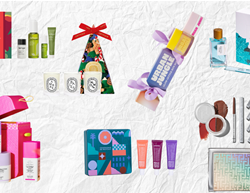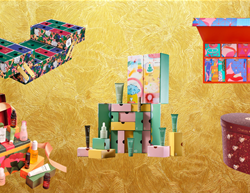After the year we’ve all had, you might feel like writing 2020 off completely. All of it. Christmas and New Year’s Eve included. But before you cancel two of the biggest events on the calendar, psychologists would like you to consider this: for the sake of your wellbeing, you could do with some holiday cheer.
“Although it may feel like the good moments have been few and far between this year, it’s even more important that we still take the time to celebrate them and show gratitude for what we have,” says Dr Addie Wootten, a clinical psychologist and CEO of not-for-profit organisation Smiling Mind. “Celebrations bring connectedness – either in person or virtually – and are opportunities to show how much we care. This year, celebrating, however we can, is so important.”
The positive effects of celebrating are twofold. Firstly, numerous studies show that practising gratitude is associated with higher levels of wellbeing, according to Harvard Health Publishing. Secondly, creating opportunities for social connections is vital for your physical and mental health. A PLoS Medicine meta-analysis on mortality risk showed that strong social relationships are linked to a 50 per cent increased likelihood of survival, while an Australian & New Zealand Journal of Psychiatry study found social connections can significantly reduce depression and anxiety symptoms. This is especially critical as mental health problems have been found to be twice as prevalent during the pandemic, compared with non-pandemic life, according to a survey published in the Medical Journal of Australia.
It’s something Min Gillespie has experienced these past few months. The Brisbane-based blogger (writeofthemiddle.com) felt she had been managing her anxiety well before 2020 turned into the year we’ll never forget, starting with the drought and bushfires in January and cascading from there. “Add in a global pandemic and so much fear of the unknown and it’s certainly triggered and elevated [my anxiety],” the 56-year-old says.
“I really don’t think I’m alone in this.”As difficult as she’s found this year, Min’s continued to celebrate special occasions in whatever way she can. For her mother’s 79th birthday during the first lockdown, her family divided themselves into pairs and celebrated with her mum at different shifts so that they could still adhere to the two-visitor-per-household rule at the time. “Of course, with all these visits, we socially distanced from Mum and were unable to hug or kiss her, which was very hard,” she says.
Min adds: “We need to hold on to those things that ground us, provide us with comfort and stop us being swept away in anxiety. I’ve personally benefited by my attempts at keeping life as normal as possible, including still celebrating every important family occasion. Those things, along with monitoring my exposure to the news, has helped to keep my anxiety under control and allowed me to have days where COVID is barely a thought in my head – and we all need those.”
The way Min has approached special occasions during COVID is what experts call “radical acceptance”. “Radical acceptance is a good strategy,” explains psychologist Briony Leo.
“This means acknowledging that things might not be just as you hoped, but that you can spend your energy making the most of what you have. Acceptance is great as it allows you to let go of the
‘why me?’ and ‘it’s not fair’, and this frees up a lot of room to explore what is possible and how you might get the very most out of your experience.” And this approach is something to keep in mind as we head into the festive season.
AND SO THIS IS CHRISTMAS? Speaking of which, what will the pandemic have in store for us this Christmas? “We should be prepared for a very different holiday season,” says Associate Professor Philip Russo, Director of Cabrini Monash University Department of Nursing Research and President of the Australasian College for Infection Prevention and Control. Russo says it’s hard to predict exactly what our summer will look like, especially as “we have wrongly predicted so many things [about COVID-19] to date”, but if the best-case scenario eventuates in which there are no other outbreaks in Australia, then certain rules might remain.
“In public settings, I suspect physical distancing will still be recommended, together with hand hygiene and maybe even the continuation of masks. I suspect in some areas there will continue to be limitations on the number of people gathering together, so this might mean we have caps put on the number of people allowed into camping grounds and limits on Christmas and New Year’s Eve gatherings. It’s very possible there will still be limits on interstate travel and I doubt there will be any international travel.” Russo adds: “It’s possible we’ll be encouraged to enjoy the summer heat in our own backyards rather than going to crowded beaches and pools.”
The bottom line is, the experts just don’t know how the pandemic will pan out. “The things we desperately want to return – time with family and friends, entertainment, holidays, etc – may gradually come back over the next 12 to 24 months, assuming outbreaks are under control,” says Russo. “Some of these may come quicker, if a vaccine is discovered, but even that may be 12 to 24 months away.”
So, as 2020 has taught us, we have to learn to live with the uncertainty. “I encourage people to try not to hypothesise too much about what the festive period will look like this year,” Wootten reminds us. “Learning to thrive in our ‘new normal’ at this present moment is enough for us to tackle for now! Try to take each moment as it comes and keep your mind focused on the here and now.”
GETTING CREATIVE
No matter how 2020 ends, one thing is for certain: our focus this Christmas will be very different from previous holidays. “This year has taught many of us that it’s the small things that matter: the feeling of the sun on our skin, the ability to get out into nature, the opportunity to share a conversation with a friend or family member,” says Wootten. She adds that this shift will be reflected over the festive season, too. “I think we’ll see less emphasis on the materialistic side of Christmas and more of a focus on being grateful for all of the wonderful people in our lives and spending quality time with our loved ones. It’s safe to say that family, friendship, health and laughter will be at the top of all of our wish lists this year.”
For Decinda MacDonald, creative director of event planning company Event Society, this is an opportunity to make Christmas extra special for you and your loved ones. “I think more than any other year, Australian families will put more effort than ever into their festive celebrations because they haven’t been able to see each other as much,” she says. “That doesn’t mean having large gatherings, but it could mean paying attention to small details that might usually be missed.”
This could include nice touches such as mailing out physical invitations to your guests, picking nice table linen and flower centrepieces, or even choosing a theme for your get-together, suggests MacDonald. “Christmas is an obvious theme, but it could be anything,” she says. “Havana Nights could see you decorating with brightly coloured linen and a Cuban-inspired menu with Latin music playing in the background. For a masquerade Christmas, you could have masks set at each place setting and take on an old-world feel with tall candelabras and a decadent roast menu.”
If you’re physically separated from loved ones, it can be a challenge to create the same celebratory energy via video calls, but Leo says that with some thought you can still make it a memorable time.
“A good idea is to record the Zoom Christmas for posterity,” suggests Leo. “Or, if you’re tech-savvy, make funny videos or slideshows to show family, taking advantage of the fact that everyone will be looking at a screen. Perhaps you can organise one-on-one Zoom calls with family during the day to make sure everyone gets a chance to catch up. Or send presents to people’s homes ahead of time so certain traditions, like gift opening, are continued.”
Remember, whatever you decide to do this Christmas, it doesn’t have to be extravagant. Focus on the little things, get creative and practise radical acceptance. “Though we might not be heading out for big fancy dinners or expensive nights out, it has been incredibly heartwarming to witness people finding new ways to express their love and appreciation,” says Wootten. “Whether that’s dropping off care packages or scheduling a face-to-face chat over Zoom, this year has shown us the true value of community and connection – which is something I hope lasts well beyond 2020.”
If you are, or someone you know is, suffering from anxiety or depression, contact Beyond Blue on 1300 224 636 or Lifeline on 13 11 14.









